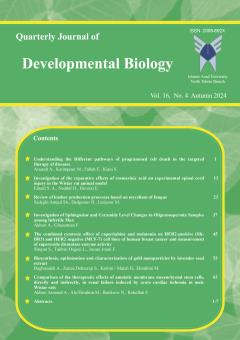The combined cytotoxic effect of capecitabine and melatonin on HER2-positive (SK-BR3) and HER2 negative (MCF-7) cell lines of human breast cancer and determination of superoxide dismutase enzyme activity
Subject Areas : Developmental biology of plants and animals , development and differentiation in microorganismsSepideh Shayan 1 , laya Takbiri Osgoei, 2 * , Fatemeh Javani jouni 3
1 - Department of Biochemistry, Faculty of Biological Sciences, Tehran North Branch, Islamic Azad university,
2 - Department of Microbiology, Faculty of Biological Sciences North
Tehran Branch Islamic Azad University. Tehran, Iran.
3 - Department of Biochemistry and biophysics, Faculty of Advanced Science and Technology, Tehran Medical Sciences, Islamic Azad University, Tehran, Iran
Keywords: Melatonin, capecitabine, breast cancer, MCF7, SK-BR-3, ,
Abstract :
Breast cancer is one of the most common cancers diagnosed in women. Melatonin is a natural indole amine synthesized in the pineal gland. A large number of studies show that melatonin can be an attractive candidate for combination therapy due to its antioxidant and cytotoxic activities. It was hypothesized that melatonin in combination with capecitabine may show a synergistic effect on MCF-7 and SK-BR-3 breast cancer cell lines. To investigate the effect of the above medicines on the level of superoxide dismutase enzyme activity, It was performed alone and in combination, on cell lines. The results showed that in both cell lines, the combined use of two medicines led to a greater increase in the activity of the superoxide dismutase enzyme. The synergistic property of these two compounds is clearly evident in the results of the superoxide dismutase enzyme. The combined use of these two compounds leads to a reduction in the dose of capecitabine. Which will result in reducing the side effects of this medicine

